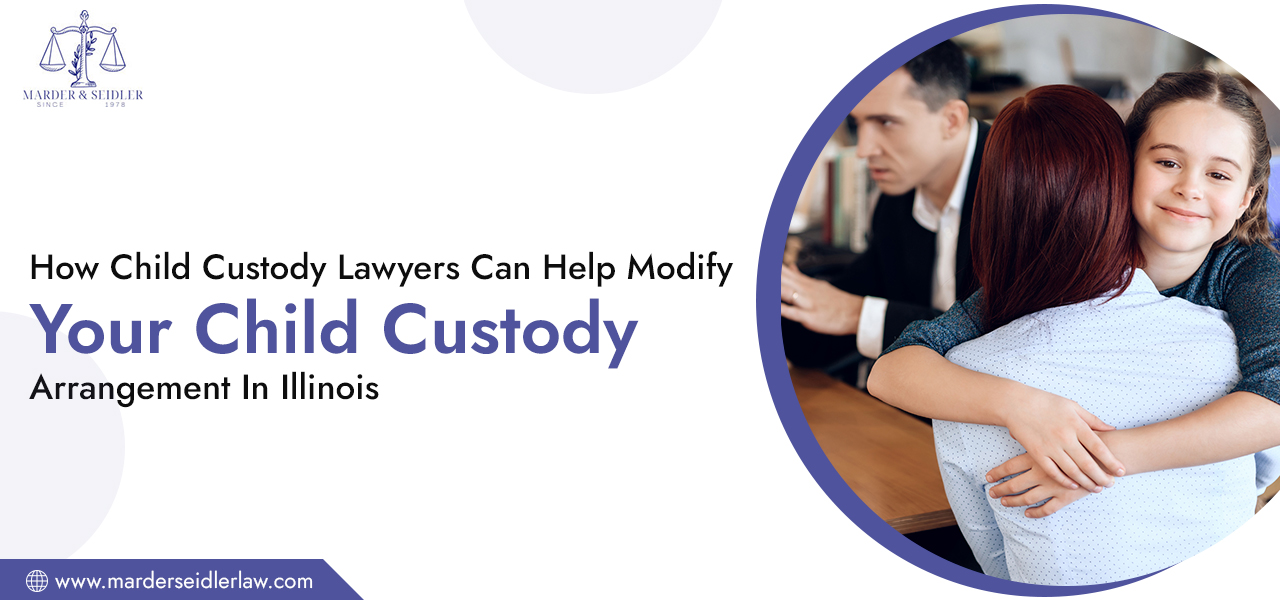How Child Custody Lawyers Can Help Modify Your Child Custody Arrangement in Illinois

Child custody arrangement can be a source of disagreement or dispute for parents, but it is essential for the well-being of the child. Custody orders are enforceable, but they are not static and can be modified if necessary. In Illinois, the process of modifying a child custody order can be a little complex, and that’s why it’s crucial to have an experienced child custody lawyer on your side to navigate the legal requirements and ensure the best outcome for you and your child. Read on to know the reasons for modifying child custody, modification process, and the role of child custody lawyers in child custody order modification.
Reasons for Modifying Child Custody Order
There are several circumstances that can support a modification of a child custody order in Illinois. Some of the most common reasons include:
1. Abuse or Neglect
If one parent is found to be abusive or neglectful towards the child, the other parent may be able to seek a modification to the custody arrangement.
2. Health Condition
A significant change in the health of a parent or the child may necessitate a modification to the custody order. This could include a physical or mental health issue that affects the parent’s ability to care for the child.
3. Substance Abuse
If one parent develops a substance abuse problem that impairs their ability to care for the child, the other parent may be able to seek a modification.
4. Loss of Job
A significant change in a parent’s financial situation, such as losing a job may be grounds for a custody modification.
f
5. Relocation
If one parent plans to move out of state or a significant distance away that affects child’s upbringing, the other parent may be able to seek a modification to the custody arrangement.
6. Child’s Preference
In some cases, if the child is of a certain age and can express a preference for where they want to live, the court may consider this in modifying the custody order.
7. Parental Unfitness
If one parent can prove that the other parent is unfit to care for the child due to factors such as abuse, neglect, mental health issues, or overall bad behavior, the court may grant a modification.
The Modification Process of Child Custody Order in Illinois
To begin the process of modifying a child custody order in Illinois, the parent seeking the modification must file a petition with the court. This petition must identify the substantial change in circumstances that warrants the modification and demonstrate that the proposed change is in the best interests of the child.
1. Proving a Substantial Change in Circumstances
One of the key requirements for modifying a child custody order in Illinois is demonstrating a substantial change in circumstances. This means that the parent who has the current custody that’s no longer provides the arrangement in the best interests of the child. Some examples of substantial changes in circumstances include:
- Abuse or neglect
- Significant health issues
- Substance abuse problems
- Loss of a job
- Relocation of a parent
It’s important to note that not all changes in circumstances will be considered “substantial” by the court. For instance, a parent’s remarriage or the birth of another child may not be enough on their own to warrant a modification.
2. Showing the Modification is in the Child’s Best Interests
In addition to proving a substantial change in circumstances, the parent seeking the modification must also demonstrate that the proposed change is in the best interests of the child. The court will consider a variety of factors when making this determination, including:
- The child’s relationship with each parent
- The child’s adjustment to their home, school, and community
- The mental and physical health of the parents
- The ability of the parents to cooperate and make decisions in the child’s best interests
- The child’s preference, if the child is of a certain age

The Role of Child Custody Lawyers in Illinois
Navigating the process of modifying a child custody order in Illinois can be complex and challenging, which is why it’s important to have an experienced Schaumburg child custody lawyer on your side. Our team of child custody lawyers can help you in the following ways:
1. Gathering Evidence
A team of child custody lawyers can help you gather the necessary evidence that you need to support your child custody case, such as documentation of changes in circumstances, witness statements, and expert evaluations.
2. Assessing Your Situation
A lawyer in Illinois can review the details of your case and help you determine if you have grounds for a custody modification. A Schaumburg lawyer can also advise you on the likelihood of success and the potential outcomes.
3. Drafting the Petition
Your lawyer can draft the petition for modification and ensure that it meets all the legal requirements and handle the filing process and ensure that the petition is properly served to the other parent.
4. Negotiating with the Other Parent
If possible, your lawyer can work with the other parent’s lawyer to try to reach an agreement on the modification. This can help avoid a lengthy and contentious court battle.
5. Representing You in Court
If the case goes to a hearing, your lawyer can represent you in court, present your evidence, and make a compelling argument for the modification.
6. Protecting Your Rights
Our team of child custody lawyers in Illinois works to protect your rights and ensure that the best interests of your child are the top priority. Book your FREE initial case evaluation appointment now!
The Role of Mediation in Custody Modifications

In Illinois, mediation is often required for custody modifications, unless there is an impairment to mediation or an emergency that prevents it. Mediation can be a valuable tool in reaching an agreement on a custody modification, as it allows the parents to work together to find a mutually acceptable solution. During the process of mediation, a third-party mediator who is neutral to both parties will help the parents communicate, identify the key issues, and explore potential solutions. The goal is to reach an agreement that is in the best interests of the child and that both parents can support. If both parties are able to reach an agreement through mediation, the modification can be formalized and made legally binding by the court. This can help avoid a contentious court battle and ensure a smoother transition for the child.
What is the Timeframe for Custody Modifications?
The timeframe for a custody modification in Illinois can vary depending on the complexity of the case and the willingness of the parties to participate in the process. In general, the process can take from several weeks to months, from the initial filing of the petition to the final court ruling. It’s crucial to note that in Illinois, there is typically a two-year waiting period before a parent can request a modification unless there is evidence of a danger to the child’s well-being. This is to provide stability for the child and to discourage parents from constantly seeking changes to the custody arrangement.
Common Mistakes That Parents Make When Requesting A Modification To A Child Custody Arrangement
Here are some of the most common mistakes parents make when requesting a modification to a child custody arrangement in Illinois:
1. Failing to comply with the terms of the existing custody order
If you are seeking to modify an existing order, the court will want to see evidence that you have been following the current arrangement. Frequently missing visitation can hurt your case for a modification. Being late with child support, or making unauthorized changes to the schedule can also hurt modification.
2. Failing to cooperate and communicate with the other parent
Courts prefer to award custody to parents who can effectively co-parent as well as make decisions together. Unilaterally making major choices or refusing to communicate with the other parent can undermine your case for a modification.
3. Not demonstrating a substantial change in circumstances
Courts are reluctant to modify custody orders unless there has been a significant change in the situation, such as relocation, serious health issues, loss of a job, or evidence of abuse. If the changes are minor or anticipated, the court is unlikely to grant the modification request.
4. Using the modification request to get back at the other parent
Seeking a change in custody as a way to punish your ex or continue the conflict is not in the child’s best interests. The court will look unfavorably on attempts to manipulate the situation for personal reasons rather than focusing on the child’s needs.

5. Disparaging the other parent to the child or others
Speaking negatively about your ex-partner to your child or others alienates the child from the other parent. It can also come back to hurt you if others are interviewed by the court. Stick to the facts and avoid emotional outbursts.
Reasons A Court Might Deny Request To Modify A Child Custody Arrangement
Here are the main reasons a court might deny a request to modify a child custody arrangement in Illinois:
-
Lack of Substantial Change in Circumstances
The court will only modify a custody order if there has been a substantial change in circumstances since the original order was put in place. Minor, temporary, or anticipated changes may not be enough to warrant a modification.
-
Modification Not in the Child’s Best Interests
Even if there has been a substantial change, the court must also find that the proposed modification is in the best interests of the child. If the court does not believe the change will benefit the child, they may deny the request.
-
Insufficient Evidence
The parent seeking the modification has the burden of providing evidence to support their claim of a substantial change and that the modification is in the child’s best interests. If the evidence presented is lacking, the court may deny the request.
-
Temporary or Anticipated Changes
If the changes in circumstances are temporary or have not yet occurred, the court may deny the modification request since it needs to be based on a permanent, already-existing change.
-
Failure to Follow Proper Procedures
The modification process has specific legal requirements, such as filing the proper petition as well as providing notice to the other parent. If these procedures are not followed correctly, the court may deny the request.
Conclusion
Modifying a child custody order in Illinois can be a complex as well as emotionally challenging process. However, it’s often necessary to ensure the best interests of the child. With the help of experienced child custody lawyers, you can navigate the legal requirements, gather the necessary evidence, and make a compelling case for the modification. Whether you are seeking a modification due to a substantial change in circumstances or because the current arrangement is no longer in the child’s best interests, a lawyer can be an invaluable ally in protecting your rights as well as securing the best possible outcome for your family.
